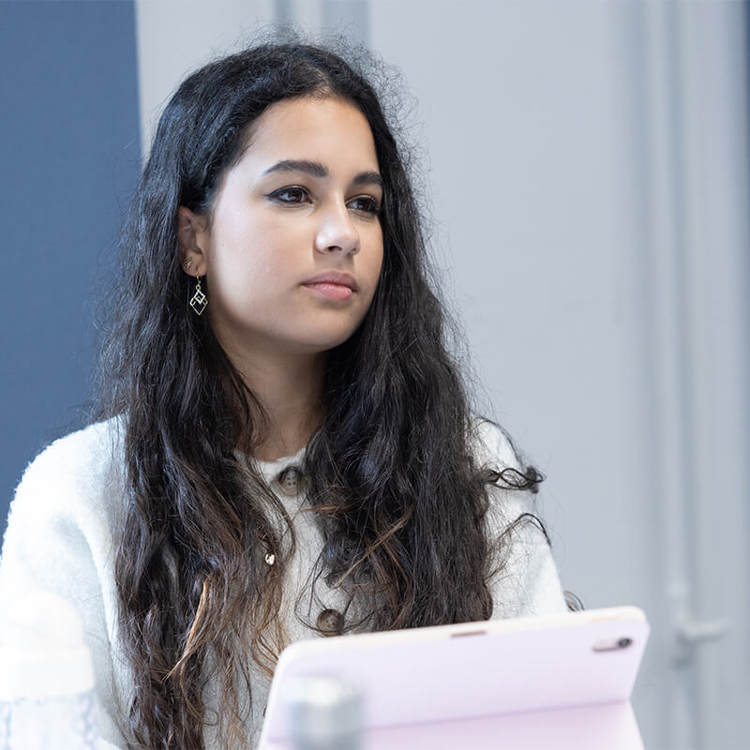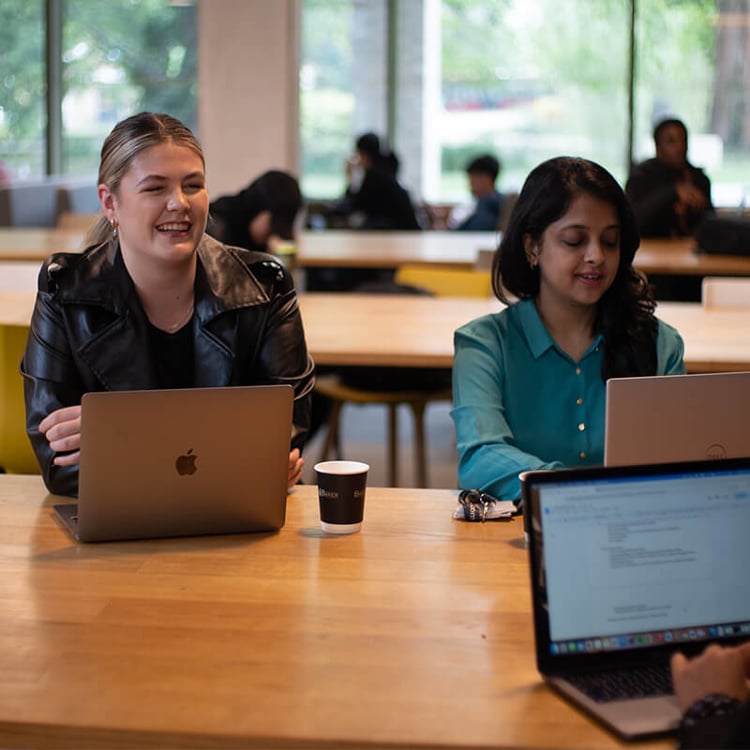Duration:
September/April: 1 year (full-time)
January: 1 year, 3 months (full-time)
Please add an additional year if undertaking the Professional Experience Year: integrated 2-year masters.
Number of credits:
180 credits at Level 7
Start date(s):
January 2026
April 2026
September 2026
This postgraduate programme will provide you with a holistic understanding of finance and business strategy in a global context. You can also participate in our progressive Global Leadership Programme alongside your MSc.
Did you know?
This programme is dual accredited to a CMI qualification
You'll be able to take advantage of London's global businesses and financial institutions such as the Bank of England or London Stock Exchange, to help develop your career
This course is available as an extended masters for international students
These are the current planned modules on this course and may be subject to change.
These are the modules you will take if you join us from September 2026 onwards.
30 credits
This module aims to equip you with the knowledge and methods necessary to address pressing strategic, social and ethical challenges businesses face.
It provides a critical understanding of Corporate Strategy and Corporate Social Responsibility (CSR) in an international context. You will learn to apply strategic concepts and tools essential for managers in multinational firms, with a focus on sustainability practices influencing business policy and stakeholder relationships. Additionally, the module emphasises the importance of data-driven decision-making and non-market strategic management, preparing future professionals to navigate the complexities of modern business environments.
The module provides a number of essential frameworks to guide future managers in analysing the main factors relevant to the strategy-making process. These frameworks are designed to offer a structured approach to strategic analysis, ensuring that all critical aspects are considered. Real-world case studies and insights from leading corporations will be utilised to illustrate the practical application of the strategic frameworks.
All business operations transpire within a complex social landscape, and non-market aspects play a significant role in strategic management. This includes political, economic, and environmental issues that can impact organisational success. The module highlights the importance of understanding these non-market factors and incorporating them into strategic planning.
You will learn how to analyse and address social and ethical issues that businesses face today. This includes topics such as corporate governance, ethical leadership, and social justice. By understanding the broader impact of business decisions, you will be able to foster a more ethical and responsible business culture.
Teaching and learning
You will gain a comprehensive understanding of strategic decision-making and how to apply it within business contexts. Each week, you will participate in a carefully organised learning experience comprising of a one-hour lecture and a three-hour workshop.
Lectures will introduce and elaborate on key concepts and frameworks pertinent to strategic decision-making. These sessions are designed around the indicative course content, aiming to give you a solid theoretical foundation. The lecture topics will encompass a broad spectrum of examples and case-based learning drawn from business practices and societal contexts to demonstrate the practical applications of these concepts. This approach ensures that you can relate theoretical knowledge to real-world scenarios, thereby enhancing comprehension and retention of the material.
Workshops will delve deeper into the theoretical approaches, exploring detailed business cases. You will examine various scenarios that are likely to arise in organisational, management, and business situations.
You will engage with real-life case studies, where you will learn to navigate complex ethical issues and make informed decisions that are both strategic and responsible. You will explore global sustainability challenges and opportunities, learning how to drive innovation through sustainable practices and responsible leadership.
You will also have 30 minutes of online support, which will include resources such as articles, videos, interactive modules and quizzes.
Assessment
This module will be assessed using two individual coursework components.
30% Poster presentation (500 words), where you will analyse and present a chosen strategic problem.
70% Executive report (3,500 words), where you will provide evidence-based recommendations in response to a strategic challenge within a case study organisation.
30 credits
Get equipped you with the theoretical knowledge and practical skills to evaluate corporate financial strategies and make evidence-based investment decisions. You will explore how organisations raise capital, manage financial resources, and assess investment opportunities in both domestic and international contexts.
The module introduces you to financial markets and institutions, short and long-term planning, and valuation methods for corporate bonds and equity. You will then progress to advanced topics such as capital structure decisions, cost of capital estimation, and strategic investment appraisal, using techniques like NPV, IRR, and project risk assessment. Through real-world case studies, you will analyse corporate financial scenarios and propose strategic recommendations that balance financial return with risk.
By the end of this module, you will have the ability to critically evaluate financial data, assess investment opportunities, and make informed strategic recommendations. These skills are directly relevant to roles in corporate finance, investment banking, and consultancy, as well as further academic study in finance-related disciplines.
Teaching and learning
A blended learning approach ensures that you develop both analytical and applied skills. Interactive workshops, case study analysis, and collaborative problem-solving will strengthen your ability to apply theory to practice, while digital resources and simulations will enhance your technical competencies.
Teaching is delivered through weekly workshops supported by 30 minutes of online digital content. In the workshop, you will deepen your understanding of corporate finance principles, financial markets, institutions, valuation techniques, and risk management, with real-world cases providing industry relevance.
Sessions are interactive and practice-focused, including quantitative exercises, case studies, investment appraisal simulations, and risk assessment tasks. You will engage in discussions and problem-solving activities to strengthen your ability to evaluate financial data and make informed decisions in global, technology-driven contexts.
Online resources and Moodle materials complement the workshops, supporting independent study and ensuring a flexible, comprehensive learning experience.
Assessment
This module will be assessed by a presentation (30%) and a case study report. (70%).
30 credits
This module provides you with a comprehensive exploration of financial performance management, focusing on the tools, techniques, and strategies used to enhance organisational performance.
It delves into both financial and non-financial reporting frameworks, cost and budgeting methods, and advanced performance measurement techniques.
You will also explore the role of governance and emerging trends, including digital transformation and sustainability reporting, to align financial performance with long-term organisational goals. The module emphasises practical applications, ensuring that you are equipped with the knowledge and skills required to navigate complex financial decision-making environments.
Teaching and learning
The teaching delivery for this module consists of one, one-hour lecture and one, three-hour workshop per week.
The lectures will cover the key concepts and foundational knowledge and introduce you to the main topics, set the stage for independent study, and stimulate interest in the subjects.
You will be encouraged to engage with the material by asking questions, and the lectures will outline the key areas to focus on for the independent study sessions. All lectures will be scheduled and accessible through Moodle.
The seminars/workshops will focus on exploring the application of the theories and frameworks discussed in the lectures. These sessions will provide you with the opportunity to critically analyse real-world cases, engage in problem-solving activities, and relate your learning to assessments.
You will discuss risk management scenarios, corporate governance challenges, and resilience frameworks, helping to bridge the gap between theory and practice.
You will also have 30 minutes of online support.
Assessment
This module will be assessed by a case study report (70%) and a group presentation (30%).
30 credits
This module explores the intersection of financial innovation and sustainability, preparing you to navigate the rapidly evolving landscape of responsible finance. You will study the structure and mechanisms of sustainable finance alongside the disruptive potential of financial technologies (FinTech).
The module introduces you to sustainable finance regulations, ESG disclosure initiatives, and green equity and debt markets, before progressing to advanced FinTech applications such as blockchain, cryptocurrencies, and AI in finance. You will also examine the risks and opportunities created by digital disruption, including global regulatory perspectives and issues of financial inclusion. By combining sustainability and technology, the module positions you to analyse how finance can contribute to the UN Sustainable Development Goals (SDGs).
By the end of this module, you will be able to critically evaluate sustainable finance strategies, apply emerging technologies to financial problems, and communicate solutions effectively to both professional and academic audiences. These skills will prepare you for careers in financial analysis, ESG investing, and FinTech innovation, as well as further research in the field.
Teaching and learning
Hands-on learning is central to the module, with opportunities to engage with industry-standard tools such as Bloomberg terminals and to pursue Bloomberg certification. You will complete case studies and simulations that require you to integrate financial and non-financial information into investment decision-making, ensuring you gain applied technical skills alongside theoretical understanding.
You will take part in weekly workshops, supported by 30 minutes of online digital content. These sessions combine lectures and seminars to build your knowledge of sustainable finance and financial technologies, using real-world examples to show how concepts apply in practice.
Interactive seminars focus on analysis and application through discussions, quizzes, case studies, and quantitative tasks. You will learn how to integrate financial and non-financial factors, including environmental, social, and governance considerations, into decision-making for diverse and technology-driven contexts.
Online resources and digital tools, including Bloomberg activities, will enhance your skills and provide opportunities to apply your knowledge. Independent study using module resource lists, readings, and Moodle materials is an essential part of the learning process.
Assessment
This module will be assessed by a group presentation (30%) and a case study report (70%).
60 credits
You will apply your knowledge to a real-world business setting.
You will choose from three career pathways:
- Consultancy challenge – collaborating with international businesses, NGOs, and community organisations, through a structured consultancy challenge, you will work in teams to tackle real-world business problems. This hands-on experience not only strengthens your professional skill set but also enhances your professional and social capital and competitiveness in the global marketplace.
- Research internship - as a research intern, you will undertake a small research project under the supervision of experienced researchers from our Centre for Sustainability and Responsible Management. You will experience projects that are beneficial for a wide range of stakeholders, including local and central governments, businesses and charitable organisations.
- Start-up pathway - if you're interested in becoming a entrepreneur, this pathway is specifically designed to support you with developing of a new venture idea.
These are the current planned modules on this course and may be subject to change.
Professional Experience Year
This course also offers the option of a Professional Experience Year. This programme combines dynamic career modules with flexible placement opportunities. After completing your first year of study, you'll then spend the next academic year completing your Professional Experience training as part of your degree. This will give you real career experience. This unique opportunity offers you distinct paths to build your expertise.

Skills
Take your place in the growing global business community.
This programme has been designed by business advisors and successful business leaders to address the demand for financial strategists in global corporations and organisations.
Wherever you’re starting from, you’ll leave Roehampton with a solid foundation in the fundamentals of global financial management, including:
- Financial and business strategy in a global context
- Critical understanding of financial management, investment and capital markets in theory and practice
Professional Development Programme
Through this mandatory, co-curricular module, you’ll practice and enhance your core skills in the following areas:
- Presenting
- Critical writing
- Research
You’ll also work on negotiation techniques, developing the credibility of your arguments to give you the competitive edge.
Professional placement
If you want to apply academic theory to the real world of business before you graduate, you can also take an optional, paid placement in Year 2. Where possible, this will be tailored to your individual interests and career aspirations. But wherever your placement takes you, it will enable you to:
- Learn on the job
- Influence decisions, and
- Contribute to business development and projects
Professional accreditation
This programme is dual accredited to a Chartered Management Institute (CIM) qualification. Upon successful completion of the programme, Roehampton on-campus students, who complete the whole programme with Roehampton, will be eligible for a CMI Level 7 qualification (subject to passing the required mapped CMI modules and CMI moderation).
Learning
Take your place in the growing global financial community.
You'll be equipped with a global perspective and learn the financial skills needed to make an impact in international organisations, including looking at ways to fund investments, free up capital whilst reducing costs and optimise financial performance
You'll be able to effectively address contemporary challenges of finance and apply latest management practices in dynamic and volatile global markets.
You’ll also have the chance to pursue a consultancy project with either a multinational corporation or a prominent SME in London.
The Roehampton Business School is a progressive and inclusive community, putting you at the centre of your learning journey.
Careers
Carve out your career on a global stage.
With an MSc Global Financial Management degree from Roehampton, you can go on to work in:
- Financial management
- Investment or finance-related advisory roles in global organisations
- Public administration or multi-national firms
- International operating SMEs

Open days
Get a real taste of our campus, community and what it’s like to study at Roehampton
Applying
UK postgraduate students apply through our direct application system.
Course subject to curriculum enhancement and revalidation.
General entry requirements
International postgraduate students apply through our direct application system.
Course subject to curriculum enhancement and revalidation.
General entry requirements
Fees and funding
UK students
Tuition fees
| Entry date | MSc |
|---|---|
| April 2026 | £11,250 |
| September 2026 | £11,250 |
| January 2027 | £11,250 |
Prices shown are for the first year of your degree.
Funding your studies
We also provide other ways to support the cost of living, including on-campus car parking, hardship support and some of the most affordable student accommodation and catering in London.
International students
Tuition fees
| Entry date | MSc | Extended Masters (1 Semester) | Extended Masters (2 Semesters) |
|---|---|---|---|
| April 2026 | £18,250 | – | – |
| July 2026 | – | £22,250 | £25,250 |
| September 2026 | £18,980 | £22,980 | £25,980 |
| January 2027 | £18,980 | £22,980 | £25,980 |
Prices shown are for the first year of your degree.
Funding your studies
We also provide other ways to support the cost of living, including on-campus car parking, hardship support and some of the most affordable student accommodation and catering in London.






